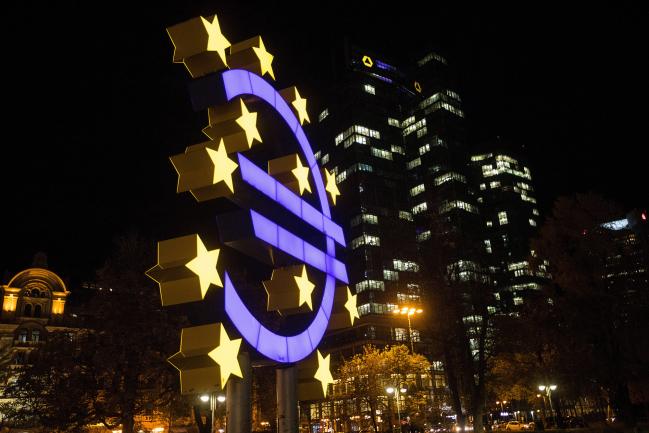(Bloomberg) -- Economists brought forward their estimate of when the European Central Bank will set an end-date for its bond-buying program, amid signs that more optimistic views on inflation might be gaining sway among policy makers.
While no action is expected at the Governing Council meeting on Jan. 25, almost half of respondents in a Bloomberg survey predicted the ECB will announce a definite end-date for asset purchases by June. Just 38 percent held that view in the previous survey last month. The first change in forward guidance is foreseen for March.
Asked when interest rates will rise, the economists said the deposit rate will be lifted to minus 0.25 percent in the second quarter of 2019 from a record-low minus 0.4 percent. The main refinancing rate will be increased over the following three months.
The outlook reflects a renewed push by some ECB officials to recognize that the strongest economic expansion in a decade will soon boost inflation and that they need to avoid falling behind the curve. On the flipside, others raised concern this week over the euro’s strength and the risk that it will undercut price pressures.
“The main topic for the next months will be communication,” said Kristian Toedtmann, an economist at DekaBank in Frankfurt. “Changes in forward guidance are likely, but they will probably not be uniform across instruments.”
Hawkish comments from policy makers who prefer to move ahead with plans to unwind the ECB’s unprecedented stimulus have dominated the public debate around the turn of the year, with Executive Board member Yves Mersch and Governing Council members Jens Weidmann and Ardo Hansson all calling for determined action. Even Executive Board member Benoit Coeure, one of the key architects of quantitative easing, said he saw a “reasonable chance” the latest extension to September would be the last.
In a sign of shifting consensus within the 25-person council, the account of the December meeting revealed that it could review its policy language early this year. The publication of that document last week helped pushed the euro to its highest level since late 2014.
Those gains alarmed some ECB officials. Vice President Vitor Constancio and Governors Francois Villeroy de Galhau and Ewald Nowotny argued in recent days that a stronger exchange rate may harm their efforts to return inflation to the goal of just below 2 percent.
The euro advanced for a second day on Friday and traded at $1.2280 at 11:35 a.m. Frankfurt time. While concerns over a potential U.S. government shutdown have weighed on the dollar this week, that trend may soon reverse. The European currency is vulnerable to a vote on Sunday that could determine whether Germany gets a stable government or will face new elections.
Wage growth in the euro area may no longer hold back an increase in price levels, but it won’t make much of a positive contribution either. More than two thirds of the economists surveyed predicted pay rises in the region will remain below the general rule of thumb of inflation plus gains in labor productivity, averaging 2.1 percent in 2018, according to the estimates provided.
The ECB currently predicts consumer-price growth will accelerate to 1.8 percent in the second half of 2020.
With opinions on the path of policy forward diverging among the region’s central bankers, Draghi may choose to buy some time and defer any decisions to the Governing Council’s March 8 meeting.
|
What Our Economists Say... “The minutes of the last meeting revealing that the central bankers are getting ready to tweak the forward guidance ‘early’ this year make a QE extension beyond 2018 less likely. The wording is likely to be changed in March to cut the link between asset purchases and inflation outlook. That would give the ECB more flexibility to end QE, even if the inflation data disappoints.”-- Maxime Sbaihi and Jamie Murray, Bloomberg Economics |
For next week, that would mean the ECB head reiterating his commitment to buy 30 billion euros ($37 billion) of assets until at least September, keep interest rates unchanged well past the end of purchases, and reinvest the proceeds of maturing debt for an extended period.
“We expect Draghi to convey a rather dovish message, pointing to still weak inflationary pressure and also emphasizing the disinflationary impact from a stronger euro,” said Carsten Brzeski, chief economist at ING-Diba AG in Frankfurt. “It would also show Draghi’s magic of how to guide financial markets with very few words and without any action.”
